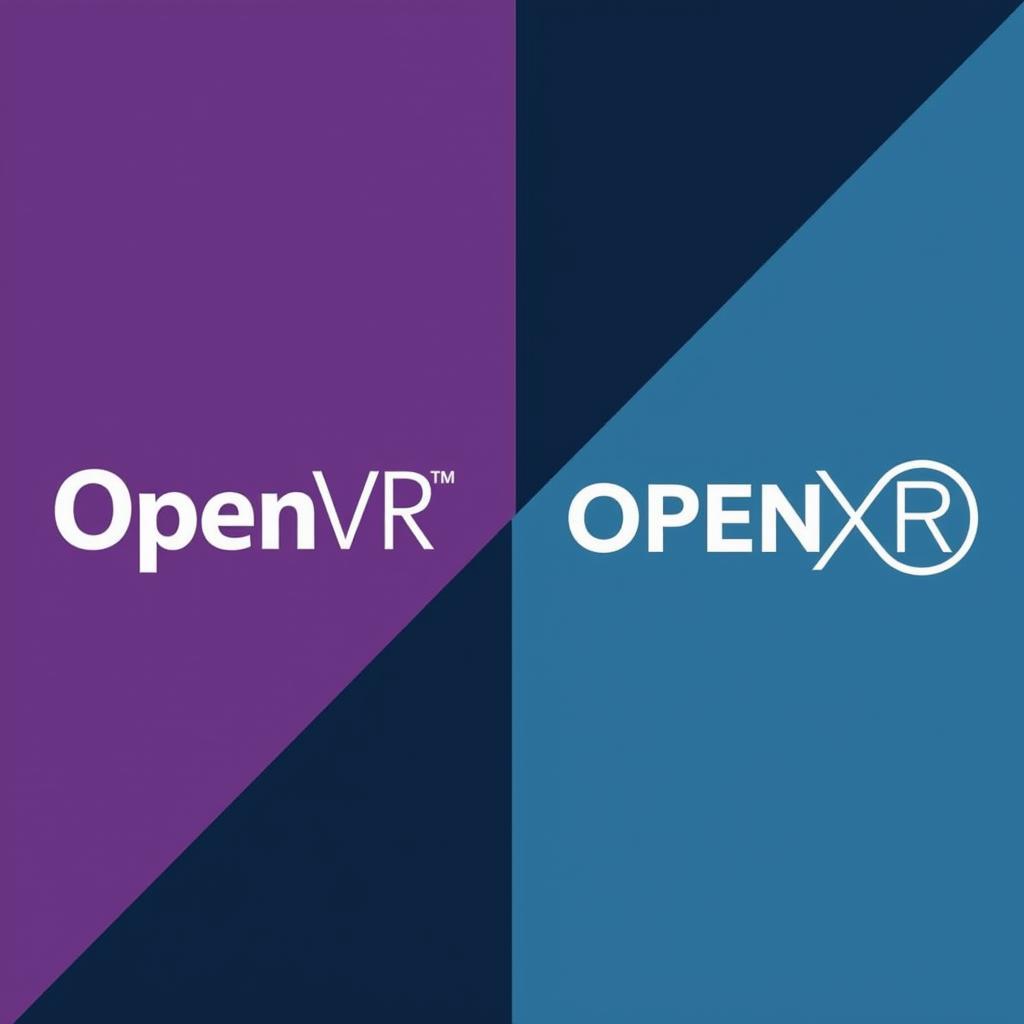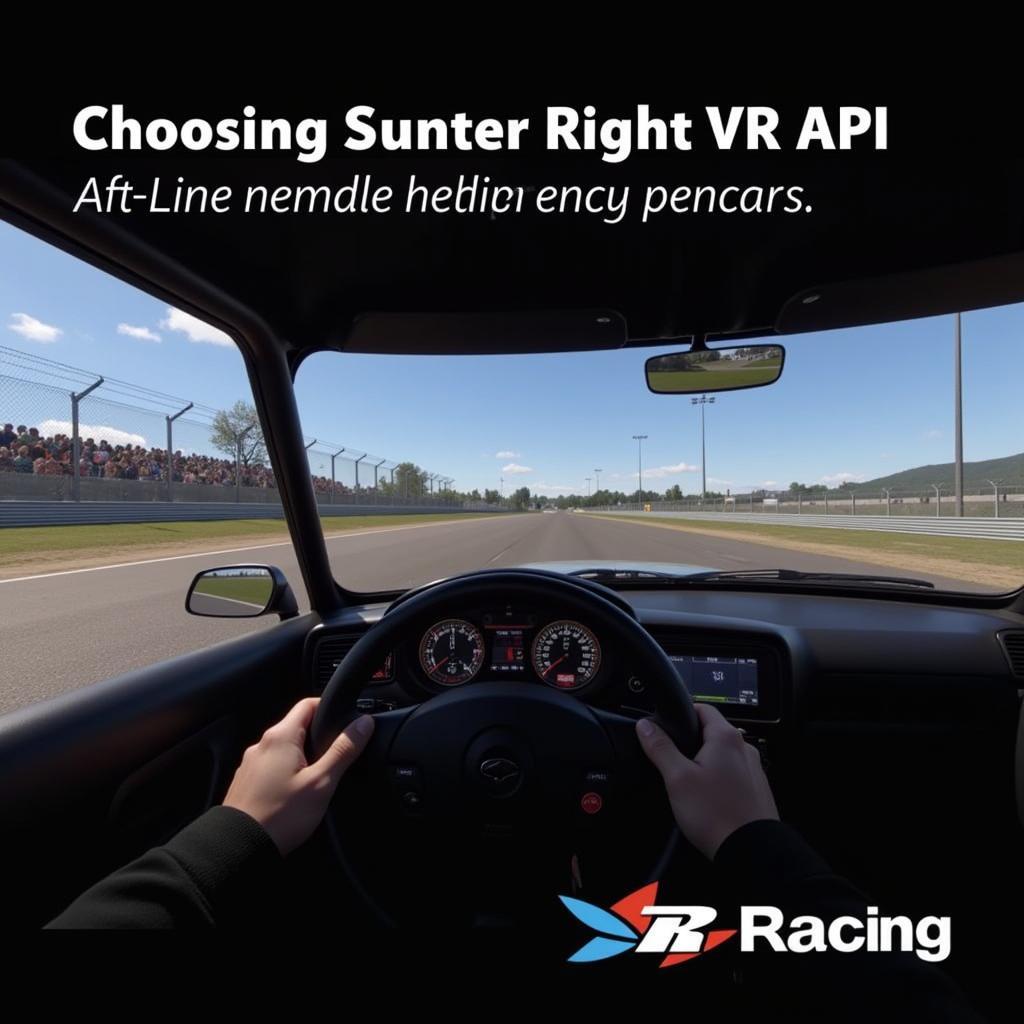iRacing OpenVR vs OpenXR: Which VR API is Right for You?
October 22, 2024For sim racers looking to elevate their experience with virtual reality, iRacing offers incredible immersion. Choosing the right VR headset is just the first step; understanding the intricacies of VR APIs like OpenVR and OpenXR is crucial for optimizing performance and compatibility. This article dives into the ongoing debate of iRacing OpenVR vs. OpenXR, helping you make an informed decision based on your individual needs and preferences.
 OpenVR and OpenXR logos side-by-side
OpenVR and OpenXR logos side-by-side
What are OpenVR and OpenXR, and Why Should You Care?
Before we delve into the differences, let’s establish a basic understanding of what VR APIs are and their significance in your iRacing experience. In simple terms, a VR API (Application Programming Interface) acts as a bridge between your VR hardware (headset and controllers) and the iRacing software. It dictates how the software communicates with your hardware, impacting performance, compatibility, and overall functionality.
-
OpenVR, developed by Valve (creators of SteamVR), has been the long-standing standard in the VR gaming world. It boasts wide compatibility with various VR headsets and offers a reliable experience for iRacing enthusiasts.
-
OpenXR, on the other hand, is a newer, open standard driven by The Khronos Group. It aims to improve interoperability and streamline VR development across multiple platforms and devices.
iRacing OpenVR vs. OpenXR: Breaking Down the Key Differences
Now, let’s examine the critical differences between OpenVR and OpenXR in the context of iRacing:
1. Performance:
-
OpenVR: Known for its mature codebase and optimization, OpenVR generally delivers solid performance on various hardware configurations. However, it can sometimes experience overhead issues, especially on less powerful systems.
-
OpenXR: While still in its relative infancy, OpenXR shows promising potential for performance improvements. Its leaner design and direct communication with hardware can result in reduced latency and increased frame rates, leading to a smoother, more responsive racing experience.
2. Compatibility:
-
OpenVR: Enjoys extensive compatibility across a wide range of VR headsets, making it a safe bet for most users. If you own a headset that’s not explicitly supported by OpenXR, OpenVR is likely your only option.
-
OpenXR: Although its compatibility list is constantly expanding, OpenXR still lags behind OpenVR. However, it already supports popular headsets from major manufacturers, and this list is expected to grow rapidly in the future.
3. Features and Development:
-
OpenVR: With its established presence, OpenVR has a wider range of features and functionalities readily available. However, its closed-source nature might lead to slower development and fewer updates.
-
OpenXR: Being an open standard, OpenXR fosters collaboration and innovation within the VR development community. This translates to faster advancements, frequent updates, and the potential for a broader range of features in the future.
4. Ease of Use:
-
OpenVR: Generally considered easier to set up and configure, particularly for users new to VR. Its integration with SteamVR simplifies the process, making it user-friendly.
-
OpenXR: Setting up OpenXR for iRacing might require a few extra steps compared to OpenVR. However, with clear instructions and community support, it’s still manageable for users of all experience levels.
Which API Should You Choose for iRacing?
The choice between OpenVR and OpenXR ultimately depends on your specific needs and priorities:
-
Choose OpenVR if: You prioritize compatibility, particularly if you own a less common VR headset. It’s also a reliable choice if you prefer a well-established and generally stable experience.
-
Choose OpenXR if: You prioritize performance and seek the potential for lower latency and smoother frame rates. Opting for OpenXR also means embracing a future-proof solution with continuous development and expanding compatibility.
Expert Insights
“While OpenVR remains a reliable workhorse, the performance gains I’ve witnessed with OpenXR in iRacing are undeniable. The future of VR racing belongs to open standards.” – [Expert Name], VR Gaming Developer
 A close-up shot of an iRacing driver wearing a VR headset with a focused expression during a race.
A close-up shot of an iRacing driver wearing a VR headset with a focused expression during a race.
Conclusion: The Future of VR Racing is Open
The iRacing OpenVR vs. OpenXR debate highlights the exciting evolution of VR technology. OpenXR, while still maturing, represents the future of VR gaming with its open nature, collaborative spirit, and potential for performance breakthroughs. As OpenXR adoption grows and developers continue to optimize for the platform, it will likely become the dominant force in VR racing.
If you require immediate compatibility or prefer a tried-and-true solution, OpenVR remains a solid choice. However, if you crave the most cutting-edge VR racing experience with the promise of future-proof compatibility and continued innovation, OpenXR is the path to choose.
Frequently Asked Questions (FAQs)
1. Can I switch between OpenVR and OpenXR in iRacing?
Yes, you can easily switch between the two APIs within the iRacing graphics settings menu. This flexibility allows you to experiment and find what works best for your system.
2. Will using OpenXR improve my lap times?
While OpenXR can contribute to a smoother and more responsive experience due to potentially lower latency and higher frame rates, it doesn’t directly translate to faster lap times. Your driving skills and practice are still the determining factors.
3. Do I need to reinstall iRacing to switch between VR APIs?
No, you don’t need to reinstall the game. Simply adjust the VR API setting within the iRacing graphics options.
4. Is OpenXR only for iRacing?
No, OpenXR is a universal VR API designed to work with a wide range of VR games and applications, fostering a more unified and interoperable VR ecosystem.
5. Where can I find more information about OpenXR and its supported headsets?
The official Khronos Group website provides comprehensive information about OpenXR, including a list of supported headsets and development resources.
Need assistance with your iRacing setup or have any further questions? Contact us!
Phone Number: +84915117113
Email: [email protected]
Address: To 3 Kp Binh An, Phu Thuong, Viet Nam, Binh Phuoc 830000, Vietnam.
Our dedicated support team is available 24/7 to assist you!